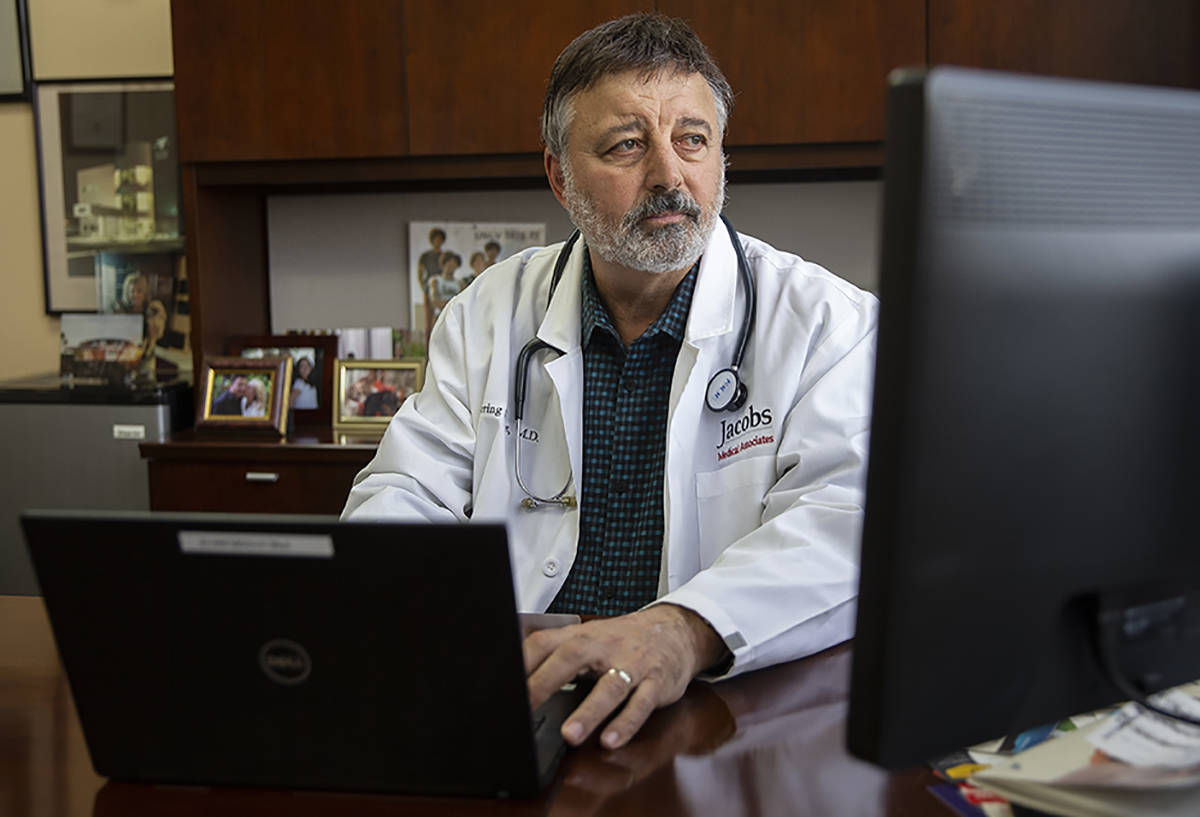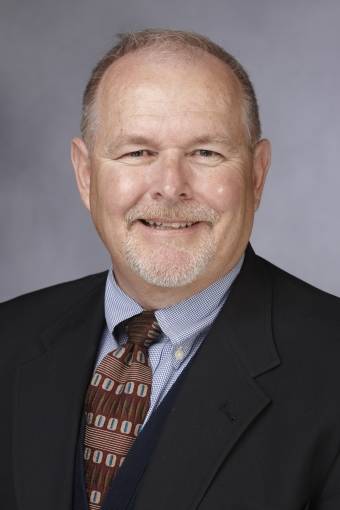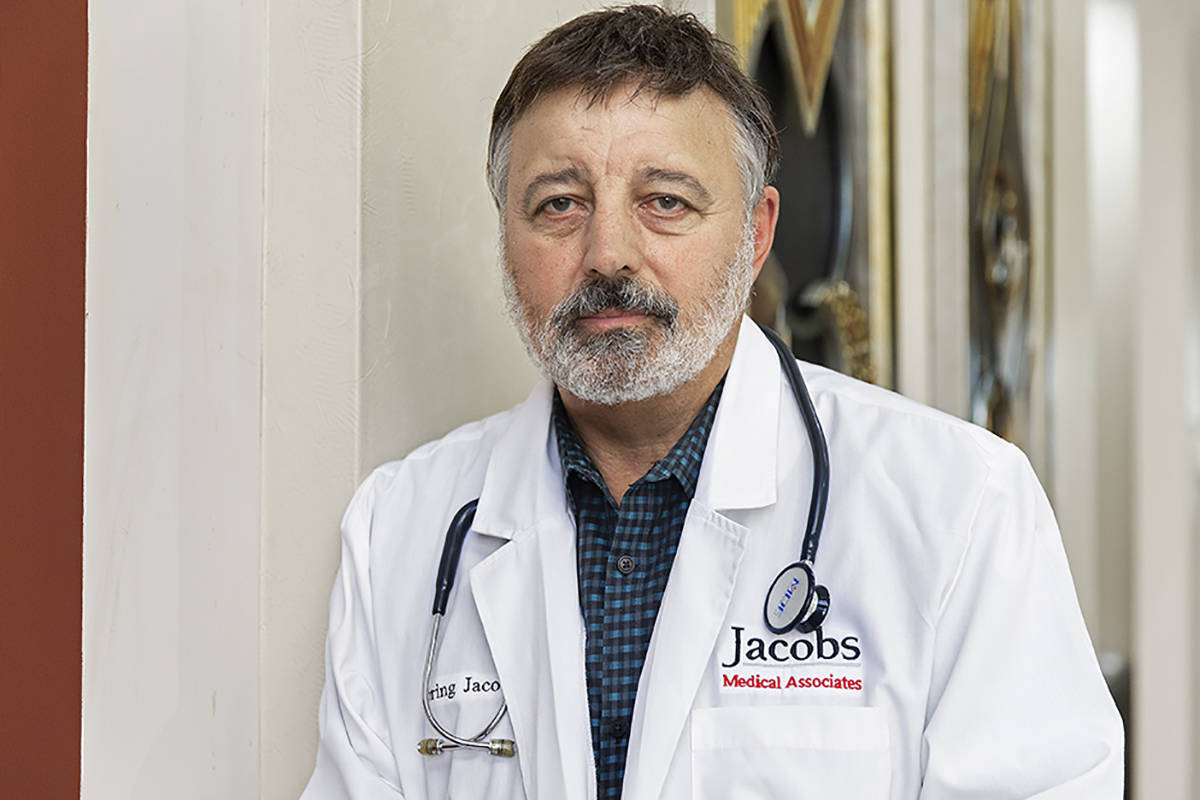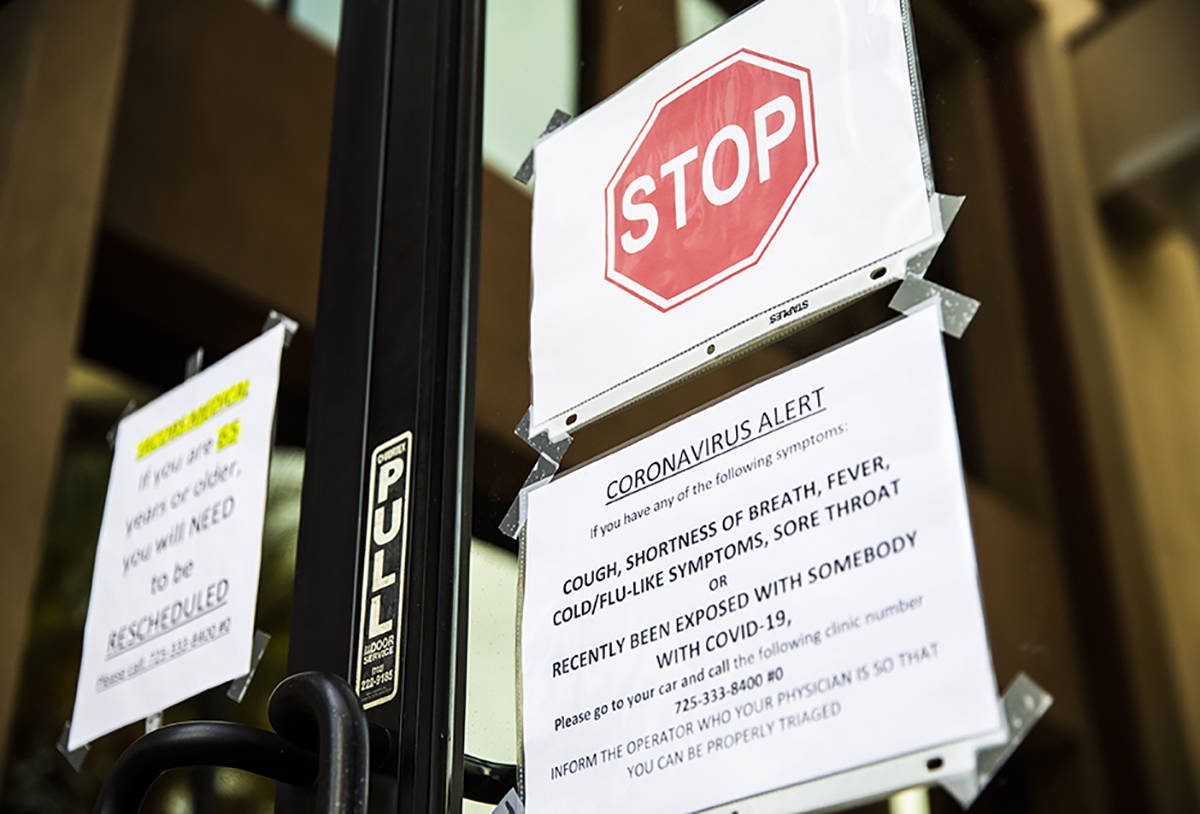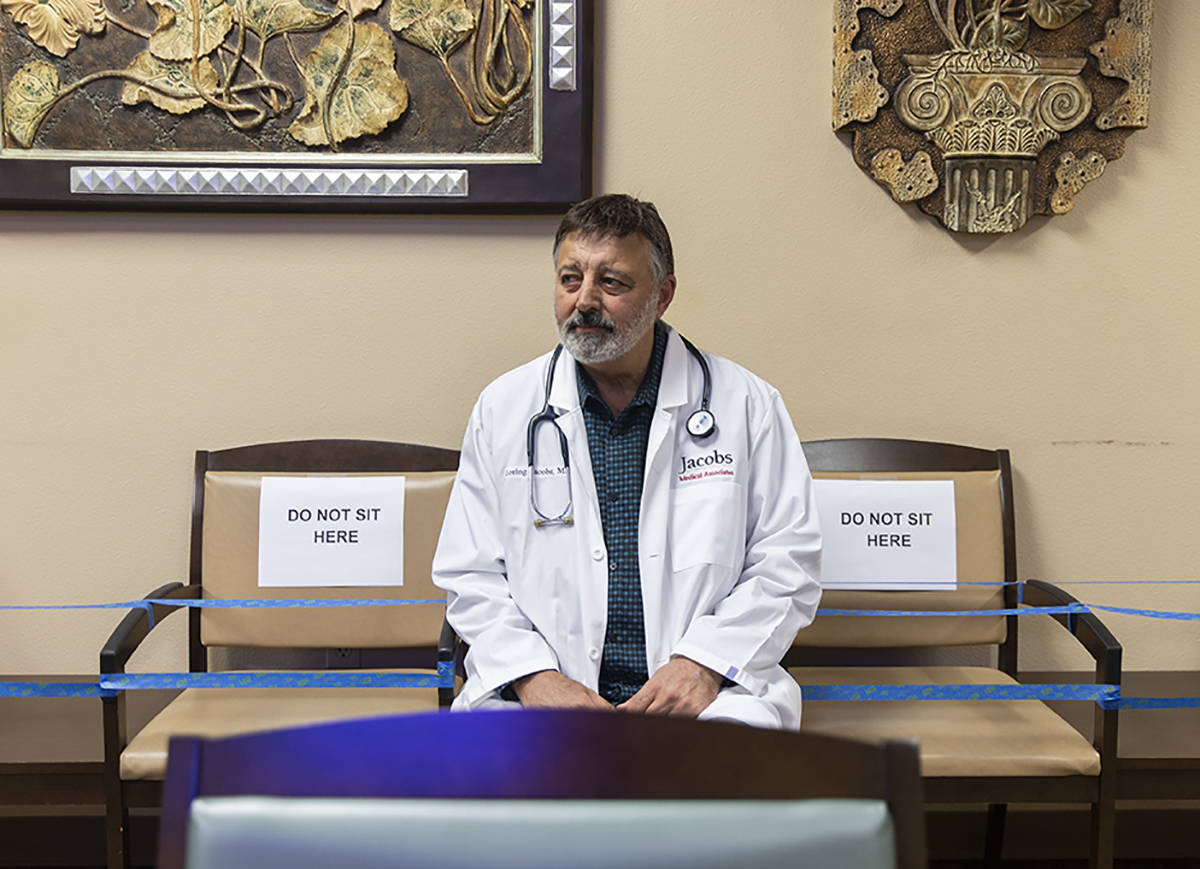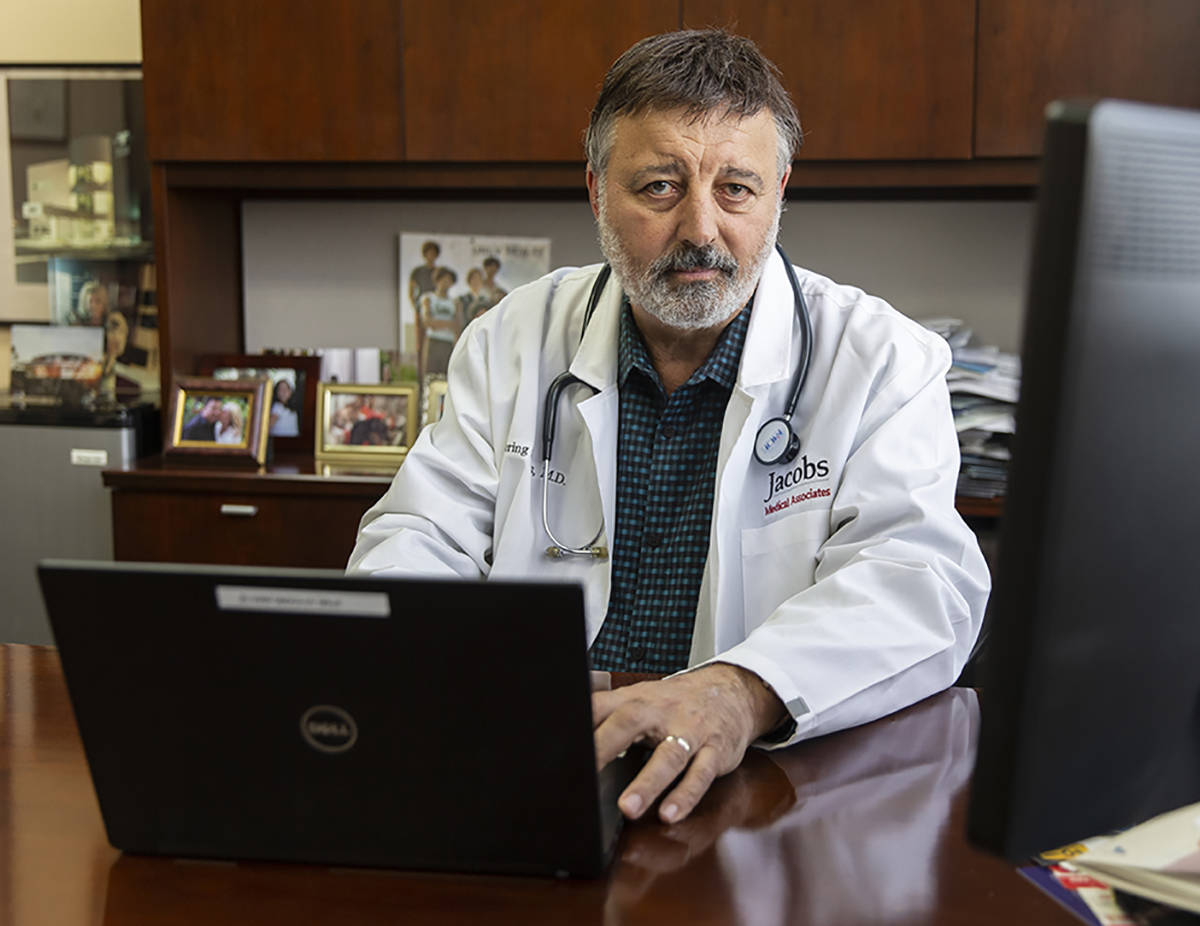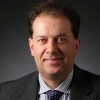Nevada doctor shortage leaves some scrambling amid virus outbreak
Nevada’s shortage of doctors means many worried patients are scrambling to find a primary care physician who can provide quick diagnoses about coronavirus symptoms or testing options.
The standard CDC advice to the public has been to “call your health care provider first.” But some Nevadans are now desperate to find a doctor as the pandemic spreads and testing ability in the Las Vegas Valley is still limited, and unreliable in some cases.
Many patients who could not immediately get in to see a primary care physician turned to a drive-up clinic at Sahara West Urgent care, which shut down Thursday after the staff became overwhelmed with patients. The clinic now requires appointments.
Nevada is ranked 46th in the nation for the primary care physician-to-patient ratio: 108 to every 100,000 residents, statistics show.
Dara Rowe, 63, is a bookkeeper for a small Las Vegas company that recently offered employees health insurance. She said she has always been healthy, so she never tried to find a doctor until she started experiencing what she feared were coronavirus symptoms last week: cough, fever and a runny nose.
“I didn’t even try doctors because I know they are slammed,” she said in a phone interview. “I don’t have a primary care physician. I don’t even know where to find one.”
Chris Cochran, chair of UNLV’s Department of Health Care Administration and Policy, said primary care doctor shortages are a problem all around the country, but Nevada is particularly hard hit.
“Part of it is we haven’t caught up with the population growth over the last 20 years,” he said. “That’s why we opened a medical school three years ago.”
The American Hospital Association anticipates the United States will be short between 21,100 and 55,200 primary care doctors over the next decade.
“This whole COVID virus should have been better anticipated from a national perspective,” Cochran added. “We kind of let our guard down the last few years.”
Physician shortage
In 2017, the last year the state Department of Health and Human Services had statistics, there were 108 primary care physicians for every 100,000 Nevada residents, while the average nationwide was 150 doctors per 100,000 people.
Cochran said patients should consider options like contacting specialists they already are seeing — a cardiologist, for example, if being treated for a heart condition. Finding a physician’s assistant or a nurse practitioner might also be appropriate.
But Nevada has a shortage of nurses and other health care professionals. During a major outbreak that might not be possible.
There were 9,500 licensed physicians in Nevada, according to 2018 Nevada Board of Medical Examiner statistics, but some counties like Esmeralda, Eureka and Storey had none. Physician’s assistant licenses doubled from about 446 in 2009 statewide to nearly 900 in 2018, but again some counties had none of those licensed professionals in the field.
In a 2017 University of Nevada - Reno study about health care professionals, Nevada ranked 48th in nursing jobs with 673.5 nurses per 100,000 residents compared to the U.S. average of 854.3 nurse per 100,000 people. The ratio of advance practice nurses was even worse with 39.6 in Nevada compared to 76.1 nationwide per 100,000 residents, the report showed. There were also about active 223 primary care doctors of osteopathic medicine in the state.
Alternative medicine
Cochran recommended calling your insurance company to find a physician to consult with over the phone or by video conference before going to urgent care or an emergency room. He said people without the virus showing up at ERs will just overwhelm resources for people who really need the care and might unnecessarily get infected by people who actually have the virus.
“What we don’t need to have is a bunch of people storming emergency rooms trying to get tested,” he said.
On Monday, Rowe said emails from her health insurance, Aetna, referred her to Teleadoc, which promised to respond in two hours. She didn’t get her consultation until Wednesday.
“They were really rude and said we’re busy,” she said of her interaction with the referral service. “I said ‘you might want to change your recording from two hours and instead say it will take two days. It isn’t two hours.’”
Teleadoc spokesman Chris Stenrud said the virus is taxing all health care resources, including at his company.
“While we have seen response times far exceed our normal standards – moving from minutes to hours in some cases – these are not normal times,” he said in an email exchange. “We regret that Ms. Rowe experienced this unusually long response time, which is not the average experience of our members, even during the current outbreak.”
Loring Jacobs, a primary care physician in Henderson, said the COVID-19 outbreak reminds him of when AIDS began to get the nation’s attention in the 1980s.
He was a resident doctor in Hollywood, California, and 24 of the 25 patients he oversaw in 1983 had AIDS.
But coronavirus, Jacobs said, is worse.
“I’ve never called in sick in my 38 years after seeing a patient,” he said. “I feel like this might be the one that gets me.”
His practice does not have test kits, and those with mild coronavirus signs are told to self-quarantine and those with more severe symptoms are referred to hospital emergency rooms or the Southern Nevada Health Department. About 10 patients were referred in the past week.
Medicare patients have been rescheduled so the elderly don’t come in contact with those with coronavirus. If they call the office to say they are sick, they are prescribed medicine without an in-person visit or sent to an emergency depending on the symptoms.
Patients with appointments for routine checkups have been rescheduled for three or four months later.
Jacobs and his staff wears masks and gloves, but aren’t as protected as they prefer. Masks, test kits and other supplies have been promised, but he said he didn’t know when they would arrive.
“Soon,” Jacobs said.
Health care options
Cochran said the UNLV medical school has yet to graduate its first class but having doctors trained in Nevada makes it more likely the physician will stay in Nevada. Insurance pays primary care doctors less than specialists so many doctors go into more lucrative practices.
“I don’t see this shortage alleviating itself anytime soon,” he said.
Rowe, who said she was exposed to her son’s friend who went to a hospital with possible coronavirus symptoms, finally was able to talk to a University Medical Center doctor by phone Wednesday. The doctor told her to stay home, drink plenty of liquids and take over-the-counter pain medications. She is binging on Vitamin C and hoping for the best.
“If you get worse, go to ER,” Rowe said the doctor told her. If you don’t get worse “stay away because we have too many people who need it.”
Review-Journal reporter Mark Anderson contributed to this report. Contact Arthur Kane at akane@reviewjournal.com. Follow @ArthurMKane on Twitter. Kane is a member of the Review-Journal’s investigative team, focusing on reporting that holds leaders and agencies accountable and exposes wrongdoing.
Related
With Nevada hospitals short on beds, leaders plan for the 'unthinkable'



